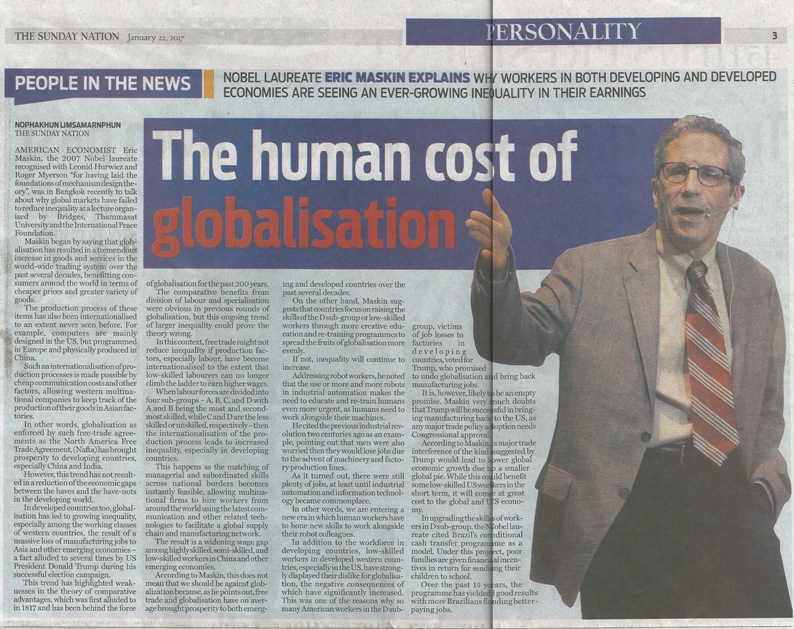|
| |
 |
|
The human cost of globalisation
|
The Nation
January 23, 2017
http://www.nationmultimedia.com/news/business/30304703

Maskin began by saying that globalisation has resulted in a tremendous increase in goods and services in the world-wide trading system over the past several decades, benefitting consumers around the world in terms of cheaper prices and greater variety of goods.
The production process of these items has also been internationalised to an extent never seen before. For example, computers are mainly designed in the US, but programmed in Europe and physically produced in China.
Such an internationalisation of production processes is made possible by cheap communication costs and other factors, allowing western multinational companies to keep track of the production of their goods in Asian factories.
In other words, globalisation as enforced by such free-trade agreements as the North America Free Trade Agreement, (Nafta) has brought prosperity to developing countries, especially China and India.
However, this trend has not resulted in a reduction of the economic gaps between the haves and the have-nots in the developing world.
In developed countries too, globalisation has led to growing inequality, especially among the working classes of western countries, the result of a massive loss of manufacturing jobs to Asia and other emerging economies - a fact alluded to several times by US President Donald Trump during his successful election campaign.
This trend has highlighted weaknesses in the theory of comparative advantages, which was first alluded to in 1817 and has been behind the force of globalisation for the past 200 years.
The comparative benefits from division of labour and specialisation were obvious in previous rounds of globalisation, but this ongoing trend of larger inequality could prove the theory wrong.
In this context, free trade might not reduce inequality if production factors, especially labour, have become international is ed to the extent that low-skilled labourers can no longer climb the ladder to earn higher wages.
When labour forces are divided into four sub-groups -A,B, C, and D with A and B being the most and secondmost skilled, while C and Dare the less skilled or unskilled, respectively - then the international is at ion of the production process leads to increased inequality, especially in developing countries.
This happens as the matching of managerial and subordinated skills across national borders becomes instantly feasible, allowing multinational firms to hire workers from around the world using the latest communication and other related technologies to facilitate a global supply chain and manufacturing network.
The result is a widening wage gap among highly skilled, semi-skilled, and low-skilled workers in China and other emerging economies.
According to Maskin, this does not mean that we should be against globalization because, as he points out, free trade and globalisation have on average brought prosperity to both emerging and developed countries over the past several decades.
On the other hand, Maskin suggests that countries focus on raising the skills of the D sub-group or low-skilled workers through more creative education and re-training programmes to spread the fruits of globalisation more evenly.
If not, inequality will continue to increase.
Addressing robot workers, he noted that the use or more and more robots in industrial automation makes the need to educate and re-train humans even more urgent, as humans need to work alongside their machines.
He cited the previous industrial revolution two centuries ago as an example, pointing out that men were also worried then they would lose jobs due to the advent of machinery and factory production lines.
As it turned out, there were still plenty of jobs, at least until industrial automation and information technology became commonplace.
In other words, we are entering a new era in which human workers have to hone new skills to work alongside their robot colleagues.
In addition to the workforce in developing countries, low-skilled workers in developed western countries, especially in the US, have strongly displayed their dislike for globalisation, the negative consequences of which have significantly increased. This was one of the reasons why so many American workers in the D subgroup, victims of job losses to factories in developing countries, voted for Trump, who promised to undo globalisation and bring back manufacturing jobs.
It is, however, likely to be an empty promise. Maskin very much doubts that Trump will be successful in bringing manufacturing back to the US, as any major trade policy adoption needs Congressional approval.
According to Maskin, a major trade interference of the kind suggested by Trump would lead to lower global economic growth due to a smaller global pie. While this could benefit some low-skilled US workers in the short term, it will come at great cost to the global and US economy.
In upgrading the skills of workers in D sub-group, the Nobel laureate cited Brazil's conditional cash transfer programme as a model. Under this project, poor families are given financial incentives in return for sending their children to school.
|
|
|
